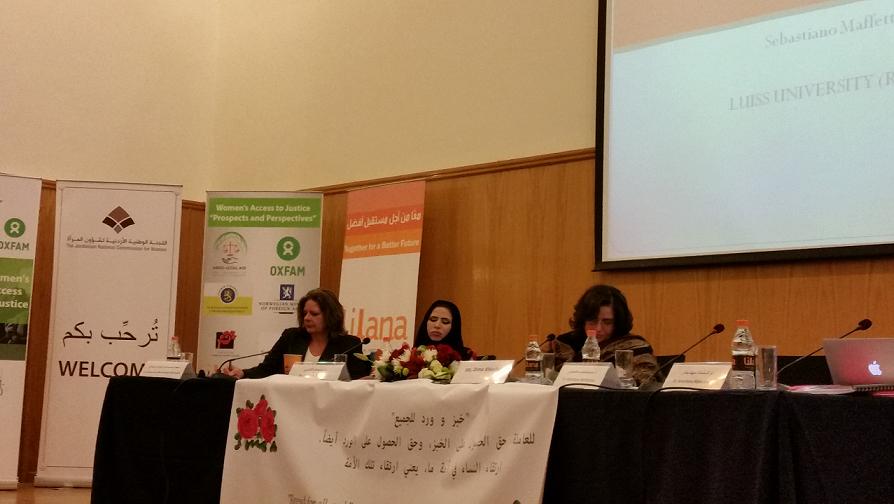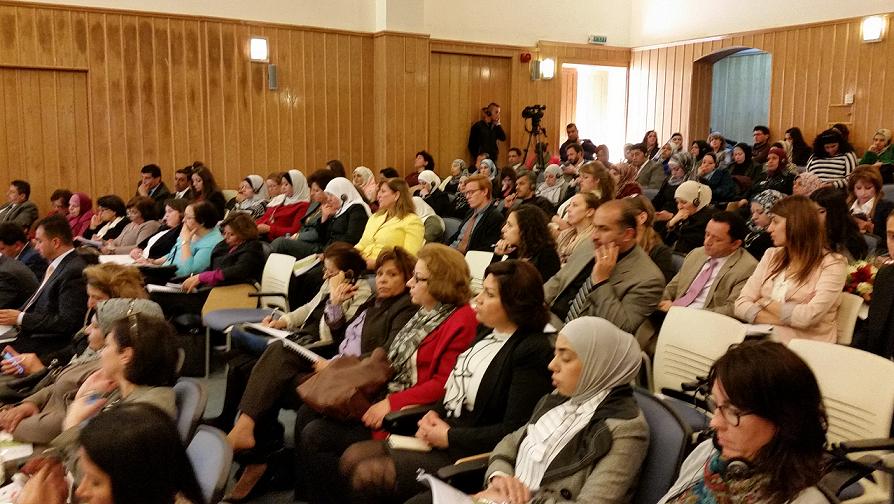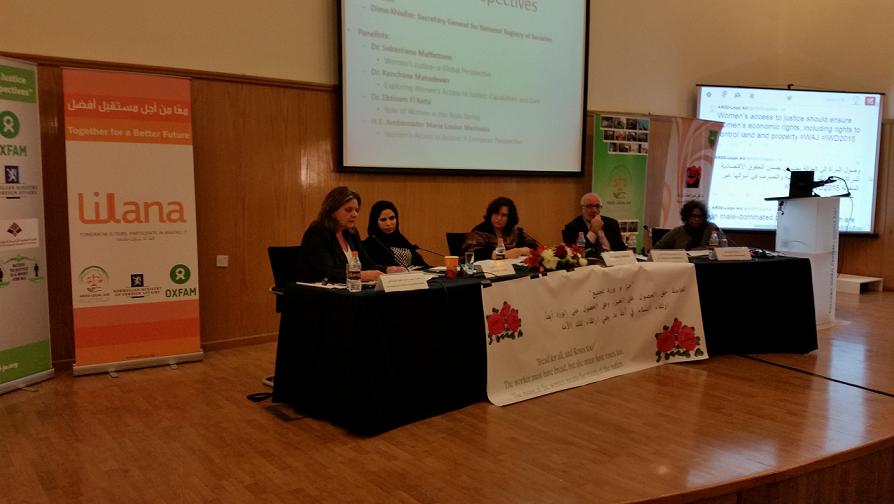Greece in the Hashemite Kingdom of Jordan  Embassy News
Embassy News International Women's Day (Amman, 8/3)
International Women's Day (Amman, 8/3)
 Embassy News
Embassy News International Women's Day (Amman, 8/3)
International Women's Day (Amman, 8/3)International Women's Day (Amman, 8/3)
Monday, 09 March 2015
Ambassador Maria Louisa Marinakis participated as an invited speaker in a Conference on Women's Access to Justice that was organized on the occasion of the International Women's Day, which was held in Amman under the patronage of HRH Princess Basma bint Talal and organized by the University of Jordan in cooperation with ARDD and Columbia Global Center - Middle East.
The topic of her speech was "Women's Access to Justice: A European Perspective"
http://jordantimes.com/ensuring-womens-access-to-justice-crucial-to-gender-equality----activists
Intervention by H.E the Ambassador of Greece
Mrs. Maria Louisa Marinakis
On the occasion of International Women’s Day
(Amman, 8/3/2015)
Subject: Women’s Access to Justice: Prospects and Perspectives/ The European Perspective
Ladies and Gentlemen,
I feel honored to have been invited today to participate among the distinguished speakers of the first biennial Conference on “Women’s Access to Justice: Prospects and Perspectives”, which takes place under the patronage of Her Royal Highness Princess Basma Bint Talal and is hosted by the Arab Renaissance for Democracy and Development- Legal Aid, in partnership with the Jordanian National Commission for Women and the Center for Women’s Studies at the University of Jordan, at the Columbia Global Center-Middle East.
This year’s theme concerning the worldwide celebration of the achievements of women, while calling for greater equality is “MAKE IT HAPPEN”. I join my voice to this end.
Being a woman, mother of two girls, of Greek origin and a European citizen, I aspire to the values of respect for human dignity, freedom, democracy, equality, the rule of law and respect for human rights and fundamental freedoms. I aspire to those values that I believe should be shared and should be promoted in all societies in which pluralism, non-discrimination, tolerance, justice, solidarity and equality between women and men should prevail, promoted and respected. The enjoy¬ment of those rights entails responsibilities and duties with regard to other persons, to the human community and to the future generations.
However aspirations lag far behind the situation we encounter in reality. This is the reason why we should engage in collective efforts οn national, regional and global level to raise awareness, in order to eradicate discrimination on the ground of sex, to eradicate violence against women and girls, especially in close relationships, as well as against other groups at risk, in all its forms. Strong political will and coordinated action are necessary in order to address the problems and protect the victims.
Access to justice, in accordance to the European perspective, is a human right and an integral element of promoting the rule of law. Equal access to justice is fundamental to ensuring the equality of women and men, not only de jure but also de facto. Assessing women’s access to justice systems in Europe is complex.
As the Council of Europe has underlined in its Gender Equality Strategy for the years 2014-2017, multiple steps and stakeholders are involved: from the initial reporting to the police to the involvement of health and social services, access to legal aid, investigations and prosecutions, and the eventual judicial decision which needs to be duly enforced.
Some of the obstacles which limit women’s opportunities to claim their rights include socio–economic, cultural, legal and procedural barriers. Let me refer to some of them:
- lack of awareness of procedures
- lack of financial resources (economic dependence and concern for the children)
- restrictions on the availability of legal aid
- emphasis placed on using out-of-court settlement procedures to ensure a swift end to the legal dispute, often leaving women at a disadvantage vs lengthy criminal proceedings
- gender neutral legislation which may lead to systemic inequalities, often unintended
- gender bias in courts among law enforcement officials, in particular regarding specific groups of women (such as for example, refugees, asylum seekers, minority, disabled , rural, trafficked women or women belonging to specific ethnic or religious groups)
- fear, shame, cultural and/or religious barriers
- insensitivity on the part of the justice system due to stereotyping
- the gendered impact of austerity measures
- corruption and low conviction rates
- discriminatory practices
All these barriers lead to high attrition rates as well as, unfortu-nately to the woman-victim’s reduced trust or complete lack of trust in the justice system.
I am sure that all of us are aware of stories of women – victims of violence, which were or are kept in the dark place shaped by taboos, traditions, stereotypes, social codes, fear, shame and ignorance. We should raise our voice! To give you en example: with the entry into force of the Convention on Preventing and Combating Violence against Women and Domestic Violence (the so called Istanbul Con¬vention, 1 August 2014), a Convention which won the Vision Award for 2014 which honored its ground-breaking nature , violence against women can no longer be considered a ”private” or “family” matter. States have the obligation to prevent violence, protect victims and punish perpetrators.
According to a survey that was launched in March 2014 by the European Union Agency for Fundamental Rights (FRA), one out of three women in countries of the European Union have experienced physical or sexual violence by an adult in their childhood. This translates to roughly 61 million women in the EU. Such levels of abuse underline the need for the EU to renew its efforts to address the widespread and under-reported abuse that girls are exposed to, including addressing the problem of forced marriage.
The results of the survey showed that violence happens every-where, in every society and EU country, regardless of social background, whether at home, at work, at school, in the street or on-line. These forms of physical, sexual and psychological violence affect women’s health, mental integrity and well-being; they can hamper women’s access to employment, thereby negatively affecting their financial independence and the economy in general. The survey proved that collection of statistics on gender-based violence is imperative. Special focus has been given to the elimination of female genital mutilation (FGM).
What are the prospects, one asks. Let me enumerate some good practices that our States can follow, related to accessing justice:
1. There can be specialized courts and fast – track procedures
2. Attention should be given to the education of specialized prosecutors
3. Dedicated police units should be formed
4. There should be unhindered access to free legal aid for women victims of violence
5. There should be access to justice and redress for women victims of violence in armed conflict
6. There should be legal standing for NGOs to bring proceedings in cases of violence against women
7. Protection orders, emergency orders , eviction orders should be enacted as well as bans on perpetrators contacting and approaching the survivors of violence.
Furthermore, the European Union is planning to dedicate possibly 2016 as the EU Year on “ending the violence against women and girls”, an important opportunity to mobilize all actors for more action and progress in preventing and combating violence against women and girls. During this year M-S will have an opportunity to address this issue at national level and raise awareness about the importance of collecting and disseminating data on violence against women.
Another recommendation emanating from the Advisory Committee on Equal Opportunities for Women and Men, is the call for implementation of the Council Conclusions agreed during the Greek Presidency of the European Union ( June 2014), which considered that gender based-violence against women and girls includes violence in close relationships, sexual violence (including rape, sexual assault and harassment in all public and private spheres of life), trafficking in human beings, slavery, sexual exploitation, and harmful practices such as child and forced marriages, female genital mutilation and crimes committed in the name of so called “honor” , as well as emerging forms of violations, such as on-line harassment, various forms of sexual abuse instigated or facilitated through the use of information and communication technology, stalking and bullying.
They also affirmed that violence against women is rooted in historical and structural inequality in power relations between women and men.
Member-States are called inter alia :
- to identify all obstacles that prevent women and girls victims of gender-based violence, notably violence in close relationships and sexual violence, from reporting to the relevant authorities and services and take concrete actions to effectively tackle the issue of under-reporting, including by reinforcing, where appropriate, special units and/or police units that deal with women victims, building trust in police and other state institutions and actors, facilitating access to justice, including legal aid, where appropriate, ensuring reliable registration and collection of complaints received by all relevant actors.
- ensure prompt and effective investigation of all cases of violence
- ensure that the women-victims and where appropriate their family members have access to specialized immediate and appropriate longer-term geographically distributed victim support services in accordance to their needs (24 hours help lines, shelters or any other appropriate interim accommodation, specialized advice and counseling centers and adequate health care services)
- enhance preventive measures by raising awareness of all forms of violence against women and girls and of its adverse impact in society, by combating -especially by engaging with young people in schools- gender stereotypes that can lead to violence against women and girls, by emphasizing the critical role and responsibility of men and boys in the process of eradicating violence against women.
- Media should be engaged in improving public awareness on violence against women and girls
- improve strategic cooperation on violence against women with international organizations and non-governmental organizations, in accordance with the EU Guidelines on Violence Against Women and the EU 2010-2015 Plan of Action for Gender Equality and Women’s empowerment.
Ladies and Gentlemen,
I referred to the legal, economic and social barriers that women around Europe face while seeking their fundamental right of accessing justice in a stable political environment, but in many cases unstable in economic terms. The result tends to become almost the same with the impacts of the unstable environment in the MENA region.
The lack of access to justice is widespread (and not only among women I would add, in order to be fair). Achieving judicial access and integrity is not a top-down, supply-driven process. It relates to inclusive societies that don’t disregard and marginalize parts of their citizens.
Bearing this in mind, The Council of Europe will organize a Conference entitled “Towards guaranteeing equal access of women to justice” (15-16 October 2015 in Bern, Switzerland), in order to build on the results of previous events and work on this area, focus on the measures needed to address persistent barriers to women’s equal access to justice; compile and disseminate good practices and provide member states, international and regional organizations as well as non-governmental organizations with practical recom¬mendations to support them in their work towards guaranteeing women’s equal access to justice.
I believe it will be worth for the ARDD-Legal Aid and other interested Jordanian organizations to follow the outcome of this event.
Ladies and Gentlemen,
We need to continuously ensure genuine civic engagement, especially with the young people, to work on education curricula in order to change stereotypes, to empower women and create a bottom-up demand for judicial accountability (1), in order to be able to talk about living in an real inclusive, democratic society which protects and equally promotes the fundamental rights of all its citizens, regardless their gender.
“WE CAN MAKE IT HAPPEN”. Women can stay safe from fear, safe from violence.
Thank you for your attention.-
-------------------------------------------------------------------------------
(1) see relevant article by AH Monjurul Kabir ( The Guardian,20/2/2014)


















